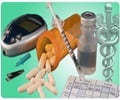Researchers led by William Ridgway at University of Cincinnati (UC) claim that they have found a therapy that can reverse the onset of type 1 diabetes in mice.

There is no cure for Type 1 diabetes though it can be controlled with insulin therapy. Symptoms of the disease include frequent urination, excessive thirst and weight loss even though you are eating more.
Researchers say the incidence of Type 1 diabetes and autoimmunity in general has risen rapidly since the mid-20th century, possibly the result of under-stimulation of innate immune systems which trigger autoimmunity in children and young adults. In Type 1 diabetes, autoimmunity causes the body's T-cells to attack its insulin-producing beta cells.
Previously, it has been reported that non-obese diabetic mice have defects in innate immune cells and that TLR4, a toll-like receptor, plays a protective role in preventing Type 1 diabetes.
Ridgway, Alice W. and Mark A. Brown Professor and Director of the division of immunology, allergy and rheumatology at UC, says his team of researchers used an agonistic monoclonal antibody, UT18, to boost the activity of TLR4 and reverse new onset diabetes in a high percentage of newly diabetic non-obese mice.
"We have shown that by using an antibody to stimulate a specific molecule in the innate immune system we can reverse—with a high rate of success—new onset diabetes in mice that have already developed the symptoms of diabetes," says Ridgway. "The cause of this reversal is a preservation of the endocrine pancreatic beta cells that produce insulin. These cells are preserved from the autoimmune attack which is the hallmark of Type 1 diabetes."
Advertisement
Ridgway says this approach differs from most in combating Type 1 diabetes because his team's therapies in mice do not directly interact with T-cells. He says treatment of autoimmunity has often been directed at suppressing an over-zealous adaptive immune response by eliminating auto-reactive T-cells.
Advertisement
"This same molecular TLR4 pathway operates in humans in many similar ways; though there are some differences, it is possible this new pathway of targeting the immune system could be tested in humans," says Ridgway.
Additional study will be required, but the therapy may hold promise because one agonistic anti-TLR4 agent is already FDA approved and others are under development, says Ridgway.
Source-Eurekalert














